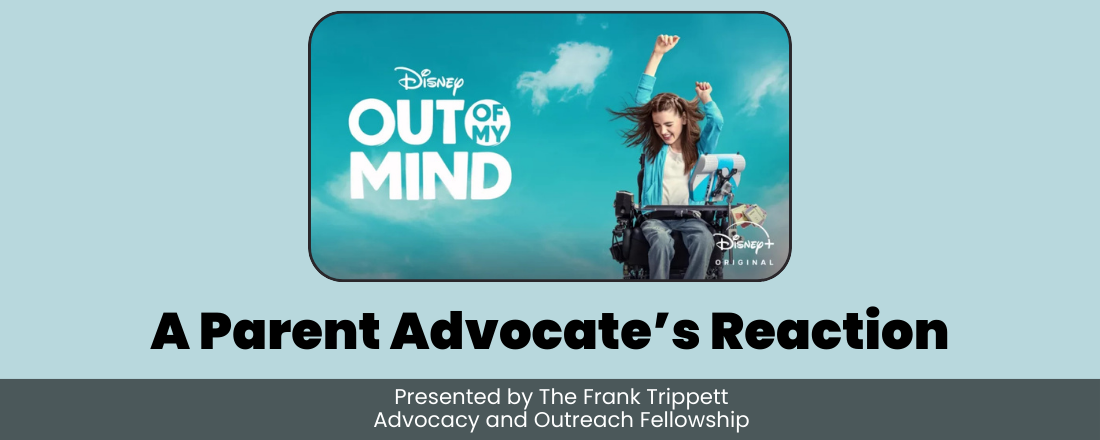
Rob Hudson is a Frank Trippett Advocacy and Outreach Fellow, and Digital Communications Manager for The Arc of Northern Virginia. Rob’s advocacy on behalf of his daughter, Schuyler, who has a rare disorder called polymicrogyria, has guided his personal philosophy for the past twenty years.
Out of my Mind: A Parent Advocate’s Reaction
Sometimes, art can sneak up on us and reveal the truths that we’ve internalized along the way. It can remind us that we’re not alone, and that we matter.
This weekend, I had the opportunity to see the Disney movie adaptation of Sharon M. Draper’s 2010 novel Out of my Mind. The film and book (and two subsequent sequels) tell the story of Melody, a bright young girl with a lot of dreams for her sixth-grade life and beyond. Melody’s ambitions and even her very thoughts go unrealized and unspoken, however. She has cerebral palsy, which has left her unable to do many of the things most of us take for granted, including speaking. In the course of the story, she is finally able to express herself using assistive technology, but her quest to be heard and seen for who she really is takes a complicated course. Through it all, her perspective remains the focus, and we experience the frustrations, both because of her CP and the societal barriers in her way, through her eyes.
I’m not a film journalist; this isn’t going to be a review, although it’s worth noting that as of this writing, Out of my Mind has a 100% rating on RottenTomatoes. And it’s not necessarily a great representation of the issues that face a great many families. Melody ultimately succeeds because she is able to demonstrate that her intellect is as sharp as anyone else’s. Her story is different in some very real ways from that of someone like Schuyler, my daughter with IDD, whose humanity and opportunities require an empathic and social model divorced from her IQ.
So I won’t hold up Out of my Mind as a universal portrait of disability life. I can only tell you this. Having watched it twice in two days, I am emotionally drained. This movie hit me where I live, and more importantly where I have lived for the past twenty years as I advocated in so many of the same ways for my now-grown daughter.
I don’t throw the word “triggering” around very lightly. And I don’t mean it in a negative way here. But after a kind of light-hearted beginning, the movie gets serious pretty quickly, and as it did so, it began to resonate with me, over and over, particularly as a father. The story centers, as it should, around Melody and her frustrations and ultimately her triumphs large and small, but as a long-time parent advocate, I was also shaken by the portrayal of her parents.
The mother is tenacious, ready for the fight at any time but also deeply fearful and protective in a way that sometimes becomes an impediment. The devoted father is convinced that there are solutions to every situation and is a tireless advocate, but he has become world-weary and deeply distrustful. Both struggle with patience at times, and make big mistakes that have lasting effects on the family. I identified with them both.
The film does an excellent job of portraying the obstacles and dismissive asides thrown at the parents by the machinery of educational and medical systems. I can remember, with new vivid clarity, similar real-world conversations that were very close to verbatim as I attended my own daughter’s IEP meetings.
“If Melody exceeds your expectations, then why don’t you raise your expectations?” the father asks, to immediate pushback from the teachers and administrators in the room. (“It’s hard to be objective about your own daughter’s limitations,” says one. “We design IEPs based on standardized assessments, not on the looks in children’s eyes.”) It felt like a transcript drawn from my own meetings back in the day. It was all familiar.
The movie explores some of the systemic obstacles faced by young people with disabilities, and I imagine those will resonate easily for parents and their kids who experienced their own version. (I suspect this movie will be more popular with parents and self-advocates than educators.) Out of my Mind resists the temptation to turn any of the characters into heroes or villains. Every one of them, even the ones that will make you want to throw things at your tv, are making choices based on what they believe they know and what tools they have at their disposal. In many cases, when they learn more, they do better.
But beyond these systemic problems, there were quieter moments that hit me hard, ones that I didn’t necessarily see coming. The first time the father hears Melody speak with the use of an assistive speech device, he is emotionally devastated, crying and laughing in the moment as if confronted by the beginnings of a happily ever after that he never truly allowed himself to fully believe in. I had that same reaction to the first time Schuyler spoke to me with her first device. I remember that feeling of “Dare we actually hope?”
The parents’ devotion to their advocacy is strongly undercut time and time again by their own shortcomings. Failure to listen to their daughter, failure to adequately imagine the possibilities at times, and most of all failure to get past their own fears. Every time they came up short, I felt it. It was strangely reassuring, watching other parents who love so hard and yet stumble. I was that parent. I still am.
“I mess up all the time,” Melody’s mother says. “You have a voice, and it is beautiful. And you have so much to say. I’m done fighting your battles. Let them hear YOU.”
I don’t know how Out of my Mind will land with others in the disability community. I think self-advocates will appreciate the lengths taken by the filmmakers to accurately and respectfully portray their subject, including casting young actors with disabilities. (The actress who portrays Melody, Phoebe-Rae Taylor, is astonishing; expect to see her again.) Teachers and administrators will be able to take comfort in the fact that the story takes place in 2002, before smart devices became ubiquitous and inclusion became a more accepted philosophy in school and in society. Citizens who may be new to the world of disability will be challenged to examine their own feelings about who deserves to feel human and have the opportunities the rest of us take for granted.
And parents? I can tell you this for certain. Parents will feel seen, and heard, and occasionally called out for some hard self-reflection. I hope this film starts some conversations that we all should be having, no matter where we stand as advocates.



